Kyegegwa battles high teenage pregnancies

Data from the district health management information system indicates that 4,034 girls aged between 15 and19 years
What you need to know:
Data from the district health management information system indicates that 4,034 girls aged between 15 and19 years, made their first antenatal care visit at end of 2020 and 66 of them were below 15 years
Leaders in Kyegegwa District are battling increasing cases of teenage pregnancies and early marriages in the area.
The leaders say teen pregnancies have led rise to in caesarean section deliveries at various health facilities as many young mothers’ bodies are not prepared to carry babies.
Data from the district health management information system indicates that 4,034 girls aged between 15 and19 years, made their first antenatal care visit at end of 2020 and 66 of them were below 15 years.
Also, between January and June this year, 2, 179 girls of ages of 15 to 19 sought antenatal care services at various health facilities.
Meanwhile, 7, 4777 adolescent girls (20 to 24 years) the district were pregnant in 2020.
Mr Edward Muhumuza, the Kyegegwa District biostatistician, on Monday said of 11,511 adolescent mothers delivered by Cesarean section last year.
Dr Martin Ayefta, the officer in-charge of Kyegegwa Health Centre IV, said on average they carry out 50 to 60 caesarian section deliveries every month and that 30 per cent are of girls below the age of 20.
“Luckily we have not lost any lives. We operate mothers yet we don’t have enough drugs, some mothers cannot afford to buy them,” Mr Ayefta said.
The Kyegegwa District Health Officer, Dr Pedson Kandole, said the cases of teenage pregnancies have increased during the Covid-19 induced lockdown.
Dr Kandole also said there is low uptake of family planning with the district’s fertility rate currently at 7.6 per cent
He added that the number of mothers delivering from health facilities is now 64 per cent.
Teen mothers speak out
A 14-year-old mother, who preferred anonymity, said the man who impregnated her had promised her a job and money.
“He told me to go to his office but we ended up in his house. When I entered, he told me to undress and had sex with me. He said if I make noise, he would kill me,” the Primary Seven pupil narrated.
She added: “The man escaped from the village when I told him about the pregnancy. My baby is two months old but it is my parents looking after us.”
Another mother, 20, who conceived at 15 while in Senior Two said her parents blame her for failing to take care of her three babies.
“My father was arrested and our mother has since abandoned us. We stay with our grandmother who cannot do much to support our education,” she said.
The Kyegegwa District chairperson, Mr John Kisoke, said many teenage mothers have been married off.
“The biggest challenge is that parents have not done much in this lockdown to protect their children. Many children are now working in bars,” he said.
Mr Kisoke accused some police officers of mediating such cases when they are reported to police.
Issue
The district probation officer, Mr Augustine Nyakabwa, said his office registered many cases of teenage pregnancy during lockdown.
He, however, advised parents to play their role of protecting children from abuse.
Mr Pauline Musigire, a primary school head teacher, attributed the high number of teenage pregnancy to high poverty levels in homes.
Mr Musigire said many parents cannot afford to provide basic needs for their children and this has made men take advantage to sexually abuse them.
“I appeal to the government to start funding teachers to start training girls in making pads, liquid soap and other menstrual needs. It could reduce the temptations these girls face,” Mr Musigire said.
RAY OF HOPE
Meanwhile, Mr Patrick Mwesigye, the director of Uganda Youth and Adolescent Health Farm, said they are partnering with the district to develop a cost action plan to end teenage pregnancies and early marriages.
“The age that would be at school is already in marriages that is why we want religious leaders, politicians, security personnel, cultural leaders and the youth to come on board and we find solutions to this,” he said.




